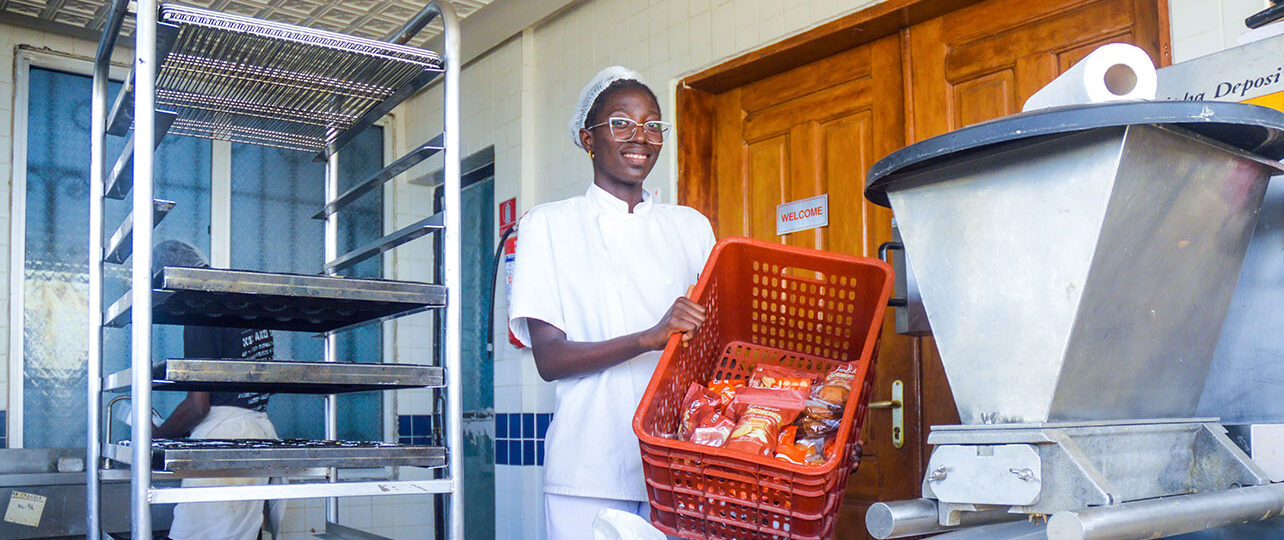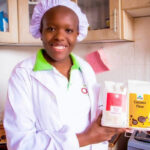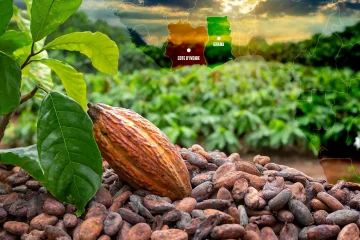IT’S a six-story climb to get to the rooftop that houses the small Bobo Biscuit Factory in Douala, Cameroon. Luckily, for those less keen on a cardio workout, there is an elevator.
The mouthwatering smells quickly lead one to a 30-square-metre workshop with large glazed windows. Sunlight floods the inside of the shop, giving workers and visitors a breath-taking view over ships loading and unloading their cargo in Douala Port. Workers busy themselves stirring dough, cleaning utensils and readying ingredients.
The room next door is the head office. From there, deliveries are planned and orders are received. Cardboard boxes full of biscuits, sables, madeleines and other tempting goodies are piling up, waiting to be dispatched to some of the hundreds of shops and stores that the brand now has as retail clients.
The business has seen huge growth ever since receiving a flood of calls on social media which encouraged the owners – who started the business in 2019 – to switch from using wheat flour to sweet potato flour, according to founder, Adeline Pelage.
“As our clients were growing in numbers, they expressed the request to have biscuits made from local raw materials”, Pelage explained.
The Bobo Biscuits initiative recently earned Adeline Pelage first prize in the Pierre Castel Award, a competition which recognises innovative and potentially game-changing projects in the field of nutrition and agriculture, across Africa.
Pelage was born in Cameroon. She travelled to France to study at a business school in Paris and although baking had been a passion from early on, her student needs would make it into more than a passion.
“In France, when I was a student, I used to bake and sell my bakeries to afford a living,” she explained.
Realising the potential of baking as a business, on achieving her business degree, she went back to school to undergo professional baking training.
When she started her bakery in Cameroon in 2019, wheat flour was easily available but food security issues arose in the wake of Russia’s invasion of Ukraine, as wheat prices soared, disrupting the grain supply and threatening food security, globally.
“The brand’s community on social media loudly voiced their demand for biscuits made essentially from local products. That transformation was incited by client feedback,” Pelage explained.
While the company decided to listen to its customers, however, the shift to locally available flour was not without its own challenges.
“It took us a year to be able to start producing biscuits with sweet potato flour.”
“Most of the farmers producing the crop are smallholders, based in remote parts of Cameroon. Their output is largely hampered by a lack of resources, lack of funding and poor infrastructure networks,” she explained.
It took Pelage a great deal of time to research and reach out to suppliers to be able to set up efficient partnerships for a reliable, regular supply of raw materials. Bobo is now supplied by producers based some 500 km from Doula, in the eastern regions of Cameroon.
“Sweet potatoes isn’t just something you will easily find in every market or every shop shelf in town. One needs to go into rural areas and small towns, meet with producers and dealers”, she detailed.
Sweet potatoes are collected from producers by local farming cooperatives and subsequently dried and ground into flour by local processors. The flour is then dispatched to urban centres across Cameroon.
The use of sweet potato flour for baking is not entirely new in Cameroon. One of the most appreciated Cameroonian products is the country’s famous Kumba bread. Made mainly from sweet potato flour, the bread got its name from the town of Kumba, in South West Cameroon, where it originated. Today, Kumba distributes the locally famous bread throughout Cameroon to the extent that it is widely regarded as integral to the country’s cuisine.
“We grew up with this bread. Every time my father travelled to the South West region, he knew that what me and my siblings expected from him was our share of Kumba bread”, laughed Ako Ambe, a father of three, who lives in Douala.
“Now I do the same with my kids. They’ve grown up with Kumba bread, it’s smooth and sweet; we all like it,” Ambe said.
In 2022, Cameroon imported 922,000 tonnes of wheat, according to the country’s Ministry of Commerce – a drag on the nation’s hard currency reserves and a potential problem in the face of supply chain disruptions.
Calls on social media for the use of locally sourced flour are the result of local tastes as well as a stirring nationalism which would see the country less reliant on foreign imports. However, according to Pelage, further efforts and investments will be required to organise mass production and distribution of tubers and local grains to the extent that they bring about full import substitution.
For now, the country must rely on individual initiatives, such as the one seen at Bobo Biscuits.














